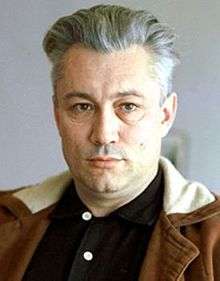Yuri Nagibin
Yuri Markovich Nagibin (Russian: Ю́рий Ма́ркович Наги́бин; April 3, 1920 – June 17, 1994) was a Russian Soviet writer, screenwriter and novelist.
Yuri Nagibin | |
|---|---|
 | |
| Born | April 3, 1920 Moscow, RSFSR |
| Died | June 17, 1994 (aged 74) Moscow, Russia |
Biography
Yuri Nagibin was born in Moscow in 1920. Nagibin's mother Ksenia Nagibina was pregnant with him when his father — Kirill Nagibin, a Russian nobleman — was executed as a counter-revolutionary before he was born. He was raised by a Jewish stepfather Mark Leventhal who was also later arrested and sent into internal exile to the Russian North in Komi Republic in 1927. Nagibin was unaware of his real father, so he assumed he was partly Jewish (Nagibin's mother was of Russian ethnicity). He found out late in life that both of his parents were in fact Russian, but he consciously related himself to Jews and condemned antisemitism, having suffered many antisemitic incidents in his early life.[1]
In 1938 he entered the Moscow State Medical University, but left it for VGIK. He wrote his first story in 1940 and soon became a member of the Union of Soviet Writers. World War II terminated his education. In 1942 he joined the Red Army as a political commissar. «My knowledge of German language determined my war specialty. I was sent to the 7th department of the Main Political Directorate of the Soviet Army — which meant counterpropaganda. I served as a counterpropagandist and political instructor, my rank equaled to that of a lieutenant. First the Volkhov Front, the Leningrad Front, then I was sent to the Voronezh Front».[2] After a serious contusion he returned to the front as a war correspondent. In 1943 he published his first collection of stories.
Nagibin was one of the most prolific Soviet screenplay writers, but he also wrote several novels and novellas, as well as many short stories and newspaper articles. Among the topics he explored was the Great Patriotic War, the life of simple people after the war, his childhood memories, village prose, ecological themes and Russian history. He traveled a lot — both inside and outside of the USSR, which also influenced his writings. One of his screenplays was The Red Tent, based on the history of Umberto Nobile's expedition to the North Pole, which was heavily rewritten during the filming process of the film of the same name.[3] He also co-wrote the screenplay for the Soviet-Japanese movie Dersu Uzala directed by Akira Kurosawa which received an Oscar for the Best Foreign Language Film in 1976.[4]
In October 1993, he signed the Letter of Forty-Two.[5]
Nagibin was married six times, yet he left no children. Among his wives was Valentina Likhachova — daughter of Ivan Likhachov — and acclaimed Soviet poet Bella Akhmadulina. His last wife, Alla Nagibina, remembered: «We met at the party. He was married, and so was I... Moscow didn't welcome me. Nobody could be beside him after Bella. Bella was incredibly talented and beautiful, the star of her time. Nagibin also wasn't an ordinary boy. He was rich as Croesus and beautiful as Alain Delon».[2] Nevertheless, they lived together for 25 years, up till Nagibin's death.
He died in Moscow on June 17, 1994 and was buried at Novodevichy Cemetery.
Screenplays
- Guests from Kuban (1955)
- The Night Guest (1958)
- Hard Happiness (1958)
- Unpaid Debt (1959)
- The Komarov Brothers (1961)
- The Slowest Train (1963)
- The Girl and the Echo (1964)
- The Chairman (1964)
- Clean Ponds (1965)
- Chase (1965)
- The Kingdom of Women (1967)
- The Red Tent (1969) (original screenplay)
- Wait for Me, Anna (1969)
- Blue Ice (1969)
- Director (1969)
- Tchaikovsky (1969)
- Dersu Uzala (1975)
- The Ivanov Family (1975)
- Jaroslaw Dabrowski (1975)
- The Beginning of the Legend (1976)
- Late Meeting (1978)
- A Painter's Wife Portrait (1982) (story)
- Rest Time from Saturday Until Monday (1984) (story)
- Kalman's Mystery (1984)
- Bambi's Childhood (1985)
- Bambi's Youth (1986)
- Above All Else (1987)
- Gardemarines ahead! (1988)
- Viva gardemarines! (1991)
- Naval Cadets III (1992)
- Il quarto re (1997) (original screenplay)
English translations
- Newlywed, from Such a Simple Thing and Other Stories, FLPH, Moscow, 1959. from Archive.org
- Island of Love, Progress Publishers, 1977.
- The Peak of Success and Other Stories, Ardis, 1986.
- Arise and Walk, Faber and Faber, 1991.
References
- Yuri Nagibin, The Diary. ed. Yuri Kuvaldin, Moscow: Book Garden, 1996, 676 pages. ISBN 5-85676-043-3
- Yuri Nagibin. A Tram's Shore documentary by Russia-K, 2010
- http://www.vilavi.ru/sud/redtent/redtent1.shtml
- "The 48th Academy Awards (1976) Nominees and Winners". oscars.org. Retrieved 2012-03-18.
- Писатели требуют от правительства решительных действий. Izvestia (in Russian). 5 October 1993. Archived from the original on 16 July 2011. Retrieved 21 August 2011.